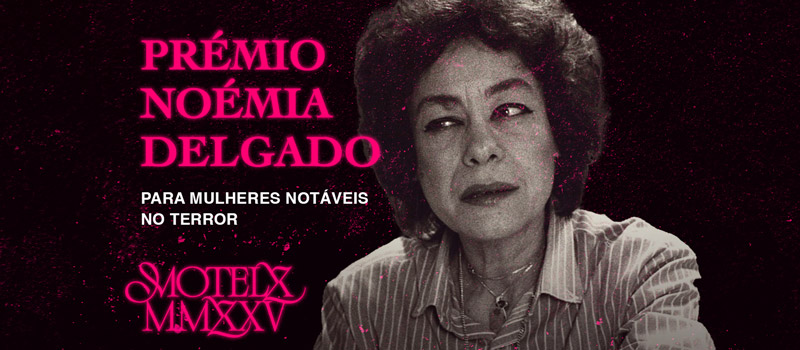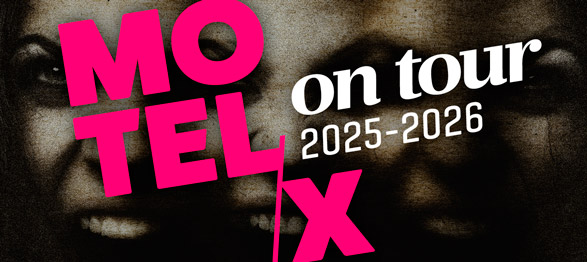News
Noémia Delgado Award for Outstanding Women in Horror - 1st Edition at MOTELX 2025
In this 19th edition of MOTELX, we present the newly established Noémia Delgado Award for Outstanding Women in Horror, an honour created to establish a well-deserved tribute to the great female creative figures of our universe, named after the most excellent, innovative and outstanding creator of Portuguese fantastic cinema - Noémia Delgado (1933–2016).

“I have always been fascinated by this kind of fantastic story, although I can hardly explain why. Perhaps it is because it represents an invasion of the real by the imaginary — and the imaginary lives within us, in our subconscious, in our fears, which one day awaken and take on monstrous or strange forms.”
Noémia Delgado (1983)
Horror is no longer an exclusively male territory, thanks to the growing presence of female filmmakers exploring the genre and its rich metaphorical possibilities. Even so, the path has been anything but easy: until the early 21st century, horror films directed by women were rare and could almost be counted on one hand. The Noémia Delgado Award, established this year by MOTELX, seeks to honor the memory of pioneering female filmmakers — often forgotten — while celebrating the new talents who are redefining contemporary horror.
Noémia Delgado (1933–2016) was born in Angola, grew up in Mozambique, and later settled in Lisbon, where, in the 1950s, she studied sculpture at Escola Superior de Belas Artes. In the early 1960s, she joined the Portuguese Film Centre — the only woman in the cooperative — and began her career editing films by directors such as Manoel de Oliveira and Paulo Rocha. She also trained with Jean Rouch in Paris.
She made her directorial debut in 1976 with the documentary “Máscaras”, in collaboration with her then-husband, the poet Alexandre O’Neill. The film focuses on the winter rituals of Trás-os-Montes, associated with the solstice and performed by masked figures. It is a work of great ethnographic and cultural value, as these age-old traditions — now recognised by UNESCO as Intangible Cultural Heritage of Humanity — were filmed for the first time here. However, the documentary was never commercially released.
After this film, she submitted several projects to Instituto do Cinema and RTP, but without success. As she explained in an interview:
“Well, I had some projects rejected by TV, so I thought that fantasy was a genre rarely seen on television and proposed making a series of fantasy tales adapted from our literature.”
Despite various difficulties — such as lack of funding and internal changes at RTP — Noémia Delgado persevered. With an almost “exploitation” spirit, she optimised resources and filmed quickly:
“What helps me is always being very aware of how much a day of filming costs.”
The artist/filmmaker freely adapted fantastic short stories by authors such as Eça de Queirós, Álvaro do Carvalhal, Júlio Dinis, and Mário de Sá-Carneiro, among others. These adaptations resulted in seven mid-length films that form the core of her work: stories populated by the undead, mermaids, sorcerers, macabre beings, and even the devil himself.
Noémia Delgado not only directed but also edited and handled the sound design of these works, fully embracing her role as an auteur — a pioneer of fantasy in Portuguese cinema and of genre cinema made by women.
“Now that I’m on the outside, I realise that I really was a very lonely woman among so many men. Back then, I fought, I struggled, but I fought with them as an equal — I didn’t think of myself as a woman fighting against men. At the time, I didn’t see it that way. I believed I had the same rights as they did, but it wasn’t because I was a woman, it was because I was a professional.”
Noémia Delgado was truly an "Outstanding Woman" in Portuguese cinema in general and an essential voice in horror and the "New Portuguese Cinema". In this horror universe of ours, her contribution in adapting fantastic tales by great authors of our "mother tongue" was absolutely pioneering, even more so due to her courage and boldness in taking on the editing and sound of her films, which only highlights her artistic dimension in the broadest sense of the word. Noémia is, therefore, a sublime figure to represent, in spirit and name, this award honouring the great female creative figures of our universe, which debuts at this 19th edition of MOTELX.
Noémia Delgado (1983)
Horror is no longer an exclusively male territory, thanks to the growing presence of female filmmakers exploring the genre and its rich metaphorical possibilities. Even so, the path has been anything but easy: until the early 21st century, horror films directed by women were rare and could almost be counted on one hand. The Noémia Delgado Award, established this year by MOTELX, seeks to honor the memory of pioneering female filmmakers — often forgotten — while celebrating the new talents who are redefining contemporary horror.
Noémia Delgado (1933–2016) was born in Angola, grew up in Mozambique, and later settled in Lisbon, where, in the 1950s, she studied sculpture at Escola Superior de Belas Artes. In the early 1960s, she joined the Portuguese Film Centre — the only woman in the cooperative — and began her career editing films by directors such as Manoel de Oliveira and Paulo Rocha. She also trained with Jean Rouch in Paris.
She made her directorial debut in 1976 with the documentary “Máscaras”, in collaboration with her then-husband, the poet Alexandre O’Neill. The film focuses on the winter rituals of Trás-os-Montes, associated with the solstice and performed by masked figures. It is a work of great ethnographic and cultural value, as these age-old traditions — now recognised by UNESCO as Intangible Cultural Heritage of Humanity — were filmed for the first time here. However, the documentary was never commercially released.
After this film, she submitted several projects to Instituto do Cinema and RTP, but without success. As she explained in an interview:
“Well, I had some projects rejected by TV, so I thought that fantasy was a genre rarely seen on television and proposed making a series of fantasy tales adapted from our literature.”
Despite various difficulties — such as lack of funding and internal changes at RTP — Noémia Delgado persevered. With an almost “exploitation” spirit, she optimised resources and filmed quickly:
“What helps me is always being very aware of how much a day of filming costs.”
The artist/filmmaker freely adapted fantastic short stories by authors such as Eça de Queirós, Álvaro do Carvalhal, Júlio Dinis, and Mário de Sá-Carneiro, among others. These adaptations resulted in seven mid-length films that form the core of her work: stories populated by the undead, mermaids, sorcerers, macabre beings, and even the devil himself.
Noémia Delgado not only directed but also edited and handled the sound design of these works, fully embracing her role as an auteur — a pioneer of fantasy in Portuguese cinema and of genre cinema made by women.
“Now that I’m on the outside, I realise that I really was a very lonely woman among so many men. Back then, I fought, I struggled, but I fought with them as an equal — I didn’t think of myself as a woman fighting against men. At the time, I didn’t see it that way. I believed I had the same rights as they did, but it wasn’t because I was a woman, it was because I was a professional.”
Noémia Delgado was truly an "Outstanding Woman" in Portuguese cinema in general and an essential voice in horror and the "New Portuguese Cinema". In this horror universe of ours, her contribution in adapting fantastic tales by great authors of our "mother tongue" was absolutely pioneering, even more so due to her courage and boldness in taking on the editing and sound of her films, which only highlights her artistic dimension in the broadest sense of the word. Noémia is, therefore, a sublime figure to represent, in spirit and name, this award honouring the great female creative figures of our universe, which debuts at this 19th edition of MOTELX.




